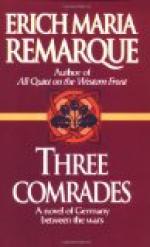The evening came. They had to make a bed for the doctor beside themselves on the hay. In the morning he drank the good milk and ate the black bread with cheese. Then the boys took him as far as the “Old Hag’s Rock.” On the way Ondrejko asked about his father. He learned that he now lived in Paris and did not purpose to come that year for the summer. The boy breathed more freely because he felt that if his father came he would have to go to him, away from Bacha Filina and away from Petrik. That would not please him; he did not want to go at all. When the doctor took leave of the boys they followed him with their eyes as long as they could see his straw hat, then they climbed the rock to see him better, but in the meantime he had disappeared altogether. Instead of that they saw on the other side of the “Old Hag’s Rock” a beautiful little valley, and in it a solitary house with small windows which was made of wood and covered with shingles, standing there by the brook. It looked like a fairy-story house set among the springs coming out from the rocks. The herder Steve had told the boys several times about witches who lived in solitary huts, and it seemed to them that one of them might be living there. A large white dog sunned himself in front of the hut. If Fido had been with them, he surely would have started a fight with him. As the boys were looking at the cottage the door opened, but no old woman came out, only a boy who was a little larger than themselves, in a cape and belt, sandals, and with a hat on his head. The dog jumped up, wagged his broad tail, and stretched himself, yawned and barked happily. The boy stroked him on the head and smiled at him, then both began to walk up toward the great rock.
The dog spied our comrades first and stopped. They could see he was not as young as Fido, but that he was wise and did not bark uselessly at anybody, so they knew that he must be friendly to people. Soon the boys stood face to face, and the strange boy, whose dress indicated that he was not from that section, greeted them in a friendly manner. He asked them what they were doing and where they were from. They told him that they had accompanied the doctor that far. Ondrejko dared to ask him if he lived in that little house.
“The hut belongs to us, but I am from Trenchin. I came only a week ago with my father. A distant uncle of my mother died, and because there is no nearer relative my mother inherited this hut. Father wants to sell it, but a nice bit of woods with fine timber belongs to the hut, which we could use very well in our business. Therefore we shall stay here for some time, cut the wood and take it along.”
“And the dog is yours?”
“Yes, it is our Dunaj. He did not want to stay at home; we had to take him along, though we had to pay for him on the railroad.”
“Surely you didn’t have him along in the carriage?” ventured Ondrejko.
“Oh, no; and he did not like where they locked him up, at all. He almost knocked me down when he regained his freedom. Isn’t that so, Dunaj?” The dog whined and cuddled down at his master’s feet.




